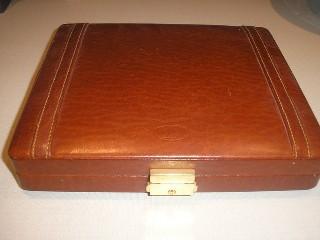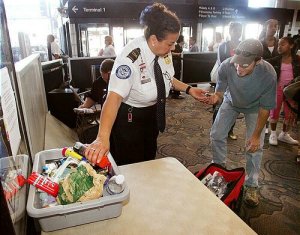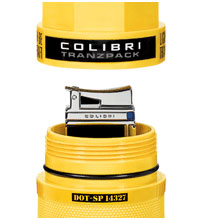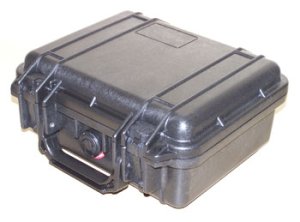Cigarticles
Cigarticle: A Wing and a Prayer - Traveling With Cigars and Accessories

Just in time for the busy post-Christmas travel season, CW Member Roger Farnsworth (ElkTwin) lets us in on a few tips for taking our hobby on the road.
 |
| Be sure to wear clean underwear |
No longer a casual endeavor, today's air travel can prove taxing. But by being aware of a few simple guidelines, you can make your next trip with cigars a breeze.
Not so many years ago there were precious few restrictions on air travel, but today's world travelers face a very confusing and sometimes inconvenient experience when trying to get from point A to point B. Despite a plethora of additional rules and regulations imposed by the Transportation Safety Administration (TSA) it is possible to travel successfully with your cigars and accessories. In order to help make sense of the current travel environment, and help make your next air excursion as painless and rewarding a possible for both you and your cigars, we offer this article.
Cutters and punches
One of the first major changes after 9/11 was the elimination of many sharp objects from the cabin of the airliner. Small pocket knives, pointed scissors and even knitting needles and nail clippers were excluded; curiously, however, cigar cutters - as long as they can not be readily disassembled and the blade removed - are specifically mentioned in the TSA guidelines as permitted carry-on items. I have had a double-bladed Zino cigar cutter in my carry-on bag on every flight for at least 12 years with absolutely no trouble.
Small, innocuous cigar punches such as the ones made by Avo and Havana should also pass effortlessly through security. One notable exception to this rule is the "bullet" punch. Airline security personnel are justifiably very restrictive when it comes to firearms and ammunition. Even replica guns and items that resemble ammunition are prohibited, so if your favorite cigar punch happens to be a sharpened .44 Magnum shell casing, do yourself a favor and leave it at home.
Sources of ignition
Current restrictions prohibit cigar and cigarette lighters from being carried on board airliners. This includes even lighters that have been emptied. The TSA screeners I have encountered have been very thorough in enforcing this rule. This means no lighters in your carry-on bags or in your pockets. Offending items will be confiscated. (Note: as of July, 2007, one personal soft-flame lighter is permitted to be carried on board. The prohibition against torch-style lighters in the cabin remains in place.)
If you absolutely can't be without a light, there is an exception. You can still carry a small quantity of matches on board an aircraft. Up to four packages of safety matches - not the strike-anywhere kind - are permitted in your carry-on luggage. Most tobacconists offer small boxes of wooden matches, and I usually carry a few packets of these in my carry-on case. Just a bit of common sense here -- no matter what, do not attempt to light one of the matches while in flight. The consequences from the flight crew will be immediate and unpleasant.
Check, please?
 |
| The Colibri Tranzpack is hard to miss |
In most cases items that are prohibited as carry-on can be put in checked baggage, but there are exceptions. Remember, there isn't a spot for an airplane to pull over at the side of the road when en-route, so for everyone's sake please understand and obey these safety regulations.
First of all, no matches of any kind are permitted in checked bags. None. Zip. Nada. The four packets in your carry-on will have to suffice.
Pressurized flammable gas and high altitude are a bad combination. No lighter refills are permitted on board an aircraft. No butane canisters or Ronson fuel, period.
Lighters without fuel are permitted in checked baggage, but the screeners have to work quickly in order to meet departure deadlines and have been known to simply remove items that appear to be prohibited - they won't always take the time to carefully inspect a lighter to ensure that it's empty. If the lighter is a favorite of yours, leave it behind. It's better to be safe than sorry.
If you absolutely must transport your lighter by air there is a recent solution. Department of Transportation (DOT) exemptions allow up to two fueled lighters to be packed in your checked bags if they are properly enclosed in a case specifically designed to hold lighters and approved by the DOT for this purpose.
To date the DOT has approved at least two specific cases for the transportation of lighters in checked baggage. One, manufactured by the Otterbox people, is designed to carry a Zippo-style lighter in a small rectangular box. Another, the Tranzpack by Colibri, encloses traditional butane lighters in a brightly colored screw-together case. Both of these are easily recognizable by TSA screeners.
The cigars themselves
Now that we have discussed the accessories, let's talk about the stars of the show, the cigars themselves. Air travel can be very stressful to cigars, and protecting them is fundamental to your enjoyment at your destination. Fortunately a few simple guidelines can help with this.
Thin dry air - the mortal enemy
 |
| A travel humidor with air tight seals and pressure valve |
Ever get off a plane after a long flight feeling tired and having dry eyes and a dry nose? Absolutely! That's because of the thin, dry air in the aircraft cabin. That thin, dry air is the mortal enemy of your cigars. Even a relatively short amount of exposure to this environment can cause substantial damage to a cigar's fragile wrapper, and longer exposure will result in more drastic effects including uneven burn, tunneling or burst wrappers while smoking.
At the very least, your traveling cigars should be placed in a ziplock bag. While changes in temperatures will cause some fluctuation of environment within the bag, at least the moisture will remain trapped close to the sticks and won't completely evaporate. For longer flights, the added protection afforded by double bagging might be more appropriate.
While wrapping the cigars in a plastic bag will protect them to a degree from environmental changes, it affords little defense against physical trauma. For additional protection, the use of a travel humidor specifically designed for air travel is recommended. In simple terms, this means a travel humidor that has an airtight seal and a pressure valve. Most leather-clad or simple aluminum travel humidors have neither of these important features and are designed mostly for local use. And, while the airtight seal is the most important feature of a travel humidor intended for air travel - because it completely protects against the damaging effects of thin, dry air - the pressure valve is useful for equalizing the inner and outer air pressure when trying to open the case at your destination.
While the atmosphere in the hold of modern airliners is maintained, the main focus of the environmental controls is on the main cabin and the comfort of the passengers. Who is to say that the hold will not experience more dramatic temperature extremes or that the baggage handlers will treat your belongings with the same respect as you? For these reasons alone I recommend that you transport your cigars as carry-on whenever possible. At the very least you'll have the extra peace of mind of having your precious cargo close at hand.
Finally, when traveling by air it pays to be both discreet and polite. Don't draw attention to yourself or your cigars while traveling, especially if you're an American traveling with Cuban cigars. While you're unlikely to run into problems, discretion affords an extra measure of insurance against unpleasant situations.
And remember, the TSA personnel and airline employees are there first and foremost to make your trip as safe as possible. If you have a disagreement with any member of the staff, try to remain as polite and courteous as possible in order to avoid escalation. These folks have a great responsibility and will generally react very unfavorably to people who are hostile or argumentative. That is not to say that you should submit to injustices or violations of your personal effects, but calm and reasoned responses are much more likely to result in a satisfying experience than confrontation. Know the rules in advance and prepare accordingly and your travel is likely to be uneventful and pleasant.

Roger Farnsworth (ElkTwin) is a husband, father, globally recognized marketing sage and erstwhile gentleman rancher with a slightly irreverant view of life. Roger has enjoyed cigars on six continents and in 18 time zones. His musings on technology can occasionally be found in respected periodicals and trade journals.